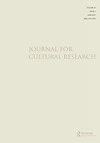American individualism and masculinity? The case of nursing homes
IF 0.6
Q1 CULTURAL STUDIES
引用次数: 0
Abstract
ABSTRACT The aim of this article is to show that opposing cultural values can coexist in the same culture at a time. The United States is typically featured as a society representative of individualist and masculine cultural values. Nevertheless, the conditions given in some contexts collide head on with this view. The case that this article examines is one of these scenarios. The analysis of more than a hundred statements from fifteen nursing homes has shown that these centres try to convey messages compatible with tribal-group and feminine values. At a vulnerable time of life, as ageing is, owing to the need for assistance or to a desire to feel safe, what is attractive is knowing that one is going to be in a place of warmth. People seek for an environment of cooperation and care and not of competition and detachment. The discourse that these centres use to attract customers, opposes somehow the individualist and masculine values that are usually associated with the American culture. Therefore, this article discusses the importance of context and the communicative situation, which tilt the discourse used by the speakers even if it does not reflect the values traditionally assigned to their cultural group.美国的个人主义和男子气概?以养老院为例
摘要本文的目的在于说明对立的文化价值在同一时间内是可以共存的。美国是一个典型的代表个人主义和男性文化价值观的社会。然而,在某些情况下给出的条件与这一观点正面冲突。本文研究的案例就是这些场景之一。对来自15家养老院的100多份声明的分析表明,这些中心试图传达与部落群体和女性价值观相一致的信息。在生命的脆弱时期,如衰老,由于需要帮助或渴望感到安全,知道自己将在一个温暖的地方是有吸引力的。人们寻求一种合作和关怀的环境,而不是竞争和疏离的环境。这些中心用来吸引顾客的话语,在某种程度上反对通常与美国文化相关的个人主义和男性价值观。因此,本文讨论了语境和交际情境的重要性,语境和交际情境使说话者使用的话语倾斜,即使它不反映传统上赋予其文化群体的价值观。
本文章由计算机程序翻译,如有差异,请以英文原文为准。
求助全文
约1分钟内获得全文
求助全文
来源期刊

Journal for Cultural Research
CULTURAL STUDIES-
CiteScore
1.40
自引率
0.00%
发文量
23
期刊介绍:
JouJournal for Cultural Research is an international journal, based in Lancaster University"s Institute for Cultural Research. It is interested in essays concerned with the conjuncture between culture and the many domains and practices in relation to which it is usually defined, including, for example, media, politics, technology, economics, society, art and the sacred. Culture is no longer, if it ever was, singular. It denotes a shifting multiplicity of signifying practices and value systems that provide a potentially infinite resource of academic critique, investigation and ethnographic or market research into cultural difference, cultural autonomy, cultural emancipation and the cultural aspects of power.
 求助内容:
求助内容: 应助结果提醒方式:
应助结果提醒方式:


